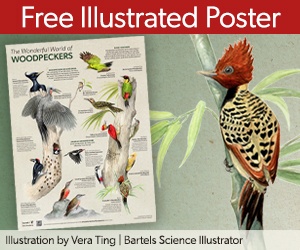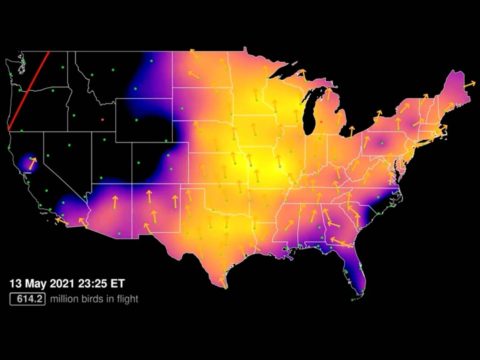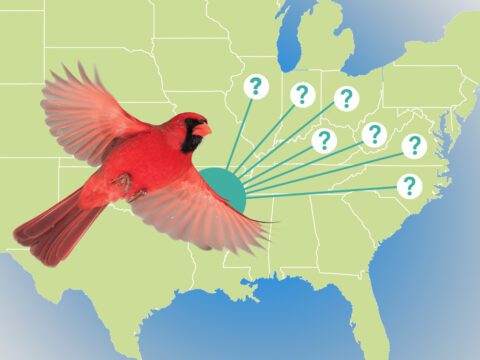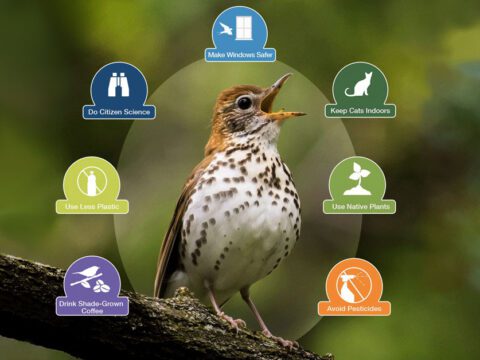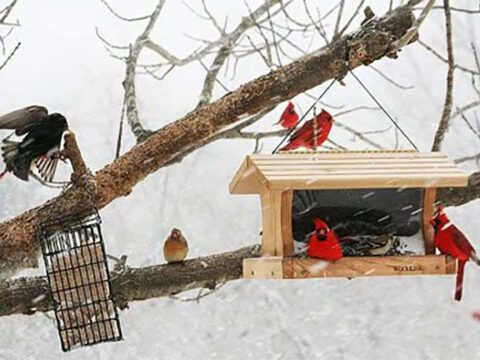Health Update: Peanuts, Salmonella, and Backyard Birds
By Hugh Powell
February 3, 2009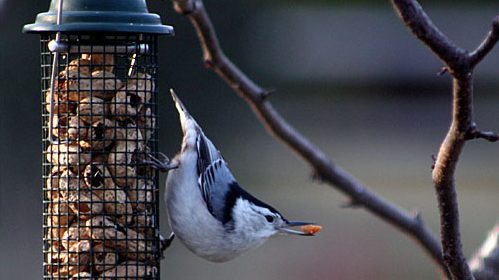
Bird watchers across the country are concerned about the recent outbreak of Salmonella from contaminated peanut products, and we’re getting several calls and e-mails per day asking us what it means for the birds at your backyard suet and peanut feeders.
Birdchick has already begun an investigation of her own by asking suet manufacturers how safe their products are. But one of the first things she discovered was that the manufacturers themselves aren’t sure – a consequence of how deeply buried in the supply chain the outbreak is. (Update: see more of Birdchick’s findings in her latest post. Update #2, Feb 18, 2009: Birdchick reports on suet recall by Scott’s. Read the recall press release.)
So I consulted the Centers for Disease Control and Food and Drug Administration websites, and talked to a few of the Lab’s Project FeederWatch folks to give you a brief synopsis of the outbreak, offer a few basic tips to go by, and point you toward more information. Here’s what I learned:
Salmonella is a virulent disease that can afflict humans, their pets, and wild birds. Between September 2008 and January 2009, a total of 529 people in 43 states became sick because of contaminated peanut products (plus one person in Canada). So far, 116 have been hospitalized and the disease may have contributed to eight deaths, according to the CDC.
The outbreak stems from a single peanut processing company. It’s the Peanut Corporation of America, located in Blakely, Georgia. Many kinds of peanut products may be contaminated, including whole, chopped, and ground-up peanuts in addition to peanut butter. The Peanut Corporation of America supplies peanuts to many food manufacturers across the country. More than 180 brands of food may be contaminated, including items you buy at the store and dishes you order in a restaurant.
Between 2007 and 2009, the Peanut Corporation of America went ahead with several shipments of peanut products after they had tested positive for salmonella. Many products made between January 1, 2007 and the present have been recalled. Here’s a list of items that have been recalled, searchable by brand name.
Peanut butter from major manufacturers is safe. Major supermarket brands of peanut butter are safe to eat, according to the CDC. That’s because those large brands process their own peanuts, whereas other food manufacturers buy their peanuts or peanut products from a supplier.
It will be difficult to be completely sure whether purchased peanut-containing suet or seed mix is safe. The list of recalled products includes some pet foods. Unfortunately, products intended for feeding wild birds are tracked and regulated separately from human and pet foods. Without knowing in detail where a bird food manufacturer purchased its peanuts or peanut butter, there’s no way to be sure it didn’t come from a tainted source.
Keep your feeders – and your hands – clean and healthy. It’s good practice to clean your bird feeders periodically, anyway. Lots of birds perch on your bird feeders, so they’re like doorknobs during a flu outbreak. To clean your feeder, take it apart and use a dishwasher on a hot setting or hand wash either with soap and boiling water or with a dilute bleach solution (no more than 1 part bleach to 9 parts water), this will kill any bacteria that may be present. Rinse thoroughly and allow to dry before refilling. After handling your feeders, scrub your hands with soap and water to keep from transferring any bacteria.
Here’s Project FeederWatch leader David Bonter with advice in a bit more detail:
Salmonellosis is caused by a bacteria belonging to the genus Salmonella. It is a common cause of mortality in feeder birds, particularly siskins, goldfinches, and redpolls, but the symptoms are not always obvious. A sick bird may appear thin, fluffed up, and may have fecal material on its vent and swollen eyelids. Infected birds are often lethargic and easy to approach. Some infected birds may show no outward symptoms, but are carriers of the disease and can spread the infection to other birds.
Salmonellosis is primarily transmitted [from bird to bird] through fecal contamination of food and water. It may also be transmitted through bird-to-bird contact. Occasionally, outbreaks of the disease cause significant mortality in certain species.
Disease transmission can be reduced by 1) cleaning areas that are contaminated with the bacteria, and 2) discouraging large flocks of birds from gathering in one location. With respect to bird feeding, we recommend the following if you live in an area experiencing a salmonellosis outbreak:
– Clean your feeders and birdbaths. To clean your feeders, take them apart and use a dishwasher on a hot setting or hand wash either with soap and boiling water or with a dilute bleach solution (no more than 1 part bleach to 9 parts water), this will kill any bacteria that may be present.
– Clean your bird feeding area by washing all structures holding your feeders and raking the ground surrounding the feeders.
– Do not reinstall your feeders for a few weeks (or until sick birds are no longer being reported in your area).
If you do continue to feed birds:
– Place your feeders in new locations around your yard.
– Vary your feeding locations so that birds do not concentrate in one location.
– Remove feeders that allow contact between fecal material and food (such as platform feeders).
– Clean your feeders several times a week, following the instructions above. Be sure that feeders are dry before filling them with seed.
The Centers for Disease Control and the Food and Drug Administration have much more information about salmonella. See a summary of the outbreak, the FDA’s searchable list of recalled foods, and the CDC’s background information on salmonella and its effects. There’s also a CDC podcast that explains the situation for kids, and a video on peanut do’s and don’ts from the FDA.
The bottom line: the chance of you – or the birds in your backyard – becoming sick from tainted peanut products is small, but real. It is definitely not safe to feed birds any of the human foods included in the CDC’s recall – you should throw those products away without opening them. And it’s always a good policy to keep your bird feeders clean, and to stay on the lookout for sick birds around your backyard.

All About Birds
is a free resource
Available for everyone,
funded by donors like you
American Kestrel by Blair Dudeck / Macaulay Library
